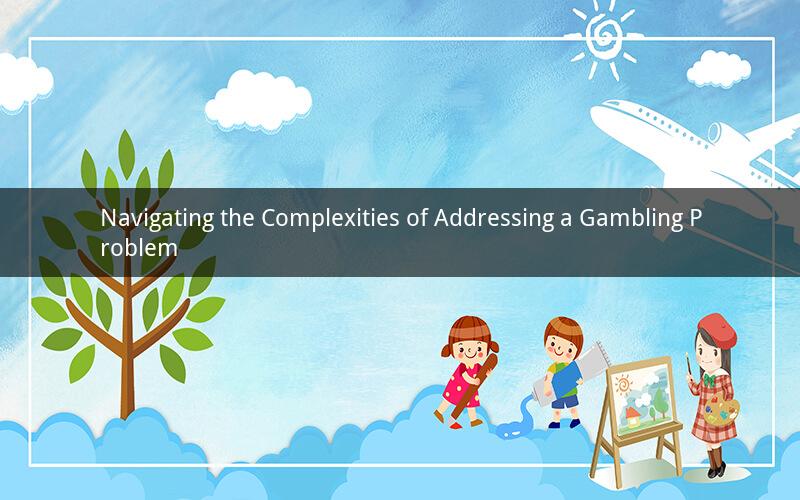
Addressing a gambling problem can be a daunting task, especially for those who are struggling with addiction. Whether it's an individual facing their own addiction or a concerned loved one looking to support someone, understanding the ins and outs of this issue is crucial. This article will explore the various aspects of addressing a gambling problem, including recognizing the signs, seeking professional help, and implementing strategies for recovery.
Recognizing the Signs of a Gambling Problem
The first step in addressing a gambling problem is to recognize the signs and symptoms. While each individual may experience these differently, some common indicators include:
1. Financial difficulties: Experiencing money problems due to gambling debts or the cost of gambling activities.
2. Emotional turmoil: Feeling guilty, ashamed, or anxious as a result of gambling behavior.
3. Time spent gambling: Prioritizing gambling over other responsibilities, such as work, relationships, and personal health.
4. Lying and deceit: Hiding gambling activities from family, friends, or colleagues.
5. Denial: Dismissing or downplaying the severity of the problem.
Seeking Professional Help
When dealing with a gambling problem, it's important to seek professional help. Therapists, counselors, and support groups can provide the necessary tools and resources to overcome addiction. Here are some options for professional support:
1. Individual therapy: Working one-on-one with a therapist to explore the underlying causes of gambling addiction and develop coping strategies.
2. Group therapy: Joining a support group, such as Gamblers Anonymous, where individuals can share their experiences and learn from others.
3. Family therapy: Engaging in family counseling to address the impact of gambling addiction on relationships and to create a supportive environment for recovery.
4. Residential treatment: Participating in a residential program that offers intensive therapy, support, and resources for those struggling with severe addiction.
Implementing Strategies for Recovery
Once professional help has been sought, implementing strategies for recovery is essential. Here are some effective methods to consider:
1. Setting boundaries: Establishing clear limits on gambling activities, such as setting a budget and limiting the time spent gambling.
2. Creating a support system: Surrounding oneself with individuals who are supportive of the recovery process and avoiding negative influences.
3. Developing healthy habits: Engaging in activities that promote well-being, such as exercise, hobbies, and spending time with loved ones.
4. Learning to manage stress: Identifying and addressing the sources of stress that may trigger gambling behavior, such as using relaxation techniques or seeking professional help.
5. Accepting responsibility: Taking ownership of one's actions and making a commitment to change.
Addressing Co-Occurring Disorders
It's not uncommon for individuals with a gambling problem to also struggle with co-occurring disorders, such as depression, anxiety, or substance abuse. Addressing these disorders is crucial for a successful recovery. Here are some considerations:
1. Identifying co-occurring disorders: Recognizing the symptoms of other mental health issues and seeking appropriate treatment.
2. Treating co-occurring disorders: Engaging in therapy or medication management to address both the gambling addiction and the co-occurring disorder.
3. Understanding the connection: Recognizing that co-occurring disorders can exacerbate the symptoms of a gambling problem and vice versa.
Frequently Asked Questions
1. Q: How can I tell if someone I know has a gambling problem?
A: Look for signs such as financial difficulties, emotional turmoil, time spent gambling, lying, and deceit. If you suspect a problem, it's important to approach the individual with empathy and concern.
2. Q: Is it possible to overcome a gambling problem without professional help?
A: While some individuals may be able to overcome their addiction on their own, seeking professional help significantly increases the chances of success. Therapy, support groups, and other resources can provide the necessary tools and support.
3. Q: What are some alternative treatments for gambling addiction?
A: In addition to traditional therapy and support groups, alternative treatments such as mindfulness, meditation, and hypnotherapy may be beneficial for some individuals. It's important to explore these options with a healthcare professional to determine the best approach.
4. Q: Can a gambling problem lead to legal issues?
A: Yes, a gambling problem can lead to legal issues, such as theft, fraud, or embezzlement, as individuals may resort to illegal means to support their addiction. It's crucial to address the problem to prevent these consequences.
5. Q: How can I support someone with a gambling problem?
A: Show empathy, be patient, and offer your support without judgment. Encourage them to seek professional help, attend support groups, and establish healthy boundaries. It's important to take care of yourself as well, as supporting someone with a gambling problem can be emotionally taxing.